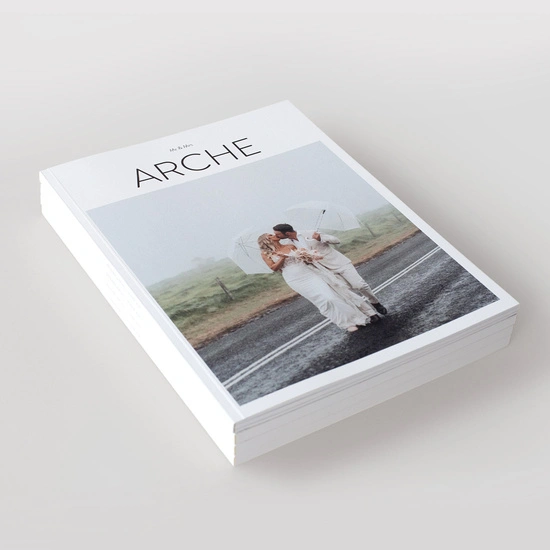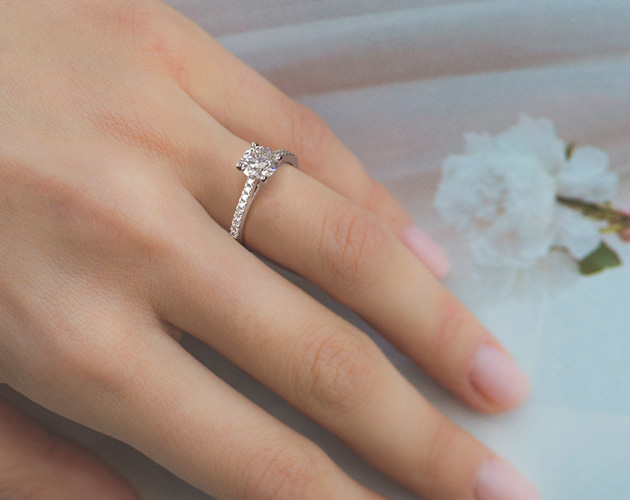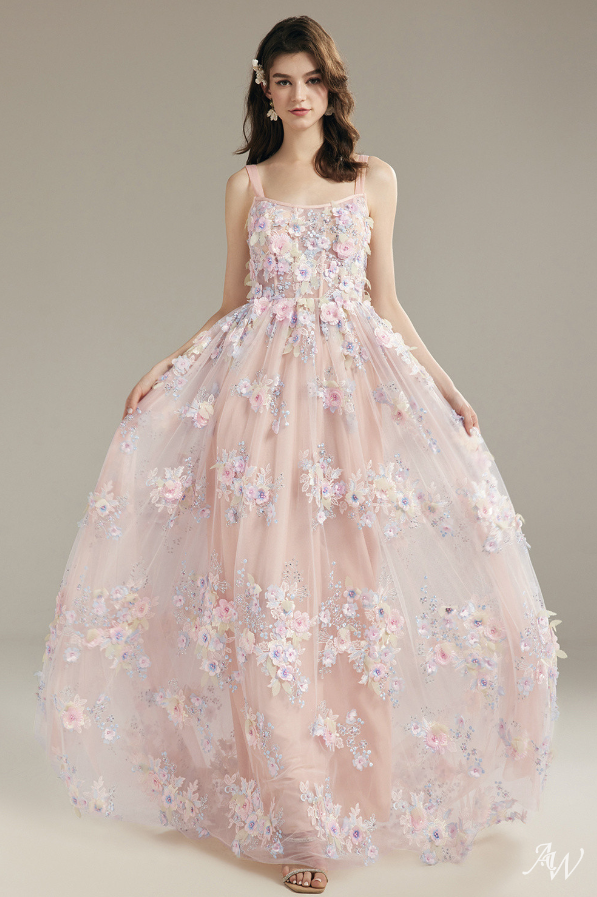So if you read Bridal Musings a lot, you’ll know I’m kind of obsessed with the idea of a backyard wedding.
Unfortunately I couldn’t have one of my own, because I live in a flat in London, and our parents’ gardens would struggle to fit a large BBQ, let alone a wedding! If you’re lucky enough to own or have access to a large house or garden, it seems like a no-brainer alternative to hiring a venue, right?
But while a backyard wedding seems like the epitome of informality, laid-back vibes, and easy-going-elegance, it’s not the hassle-free, budget-friendly option it seems.
In fact, the most straight-forward weddings to plan often tend to be the ones with a generic package in a generic venue that covers everything, rather than the cool barefoot boho garden party, that despite the simple aesthetics, actually took a lot of logistics to pull off!
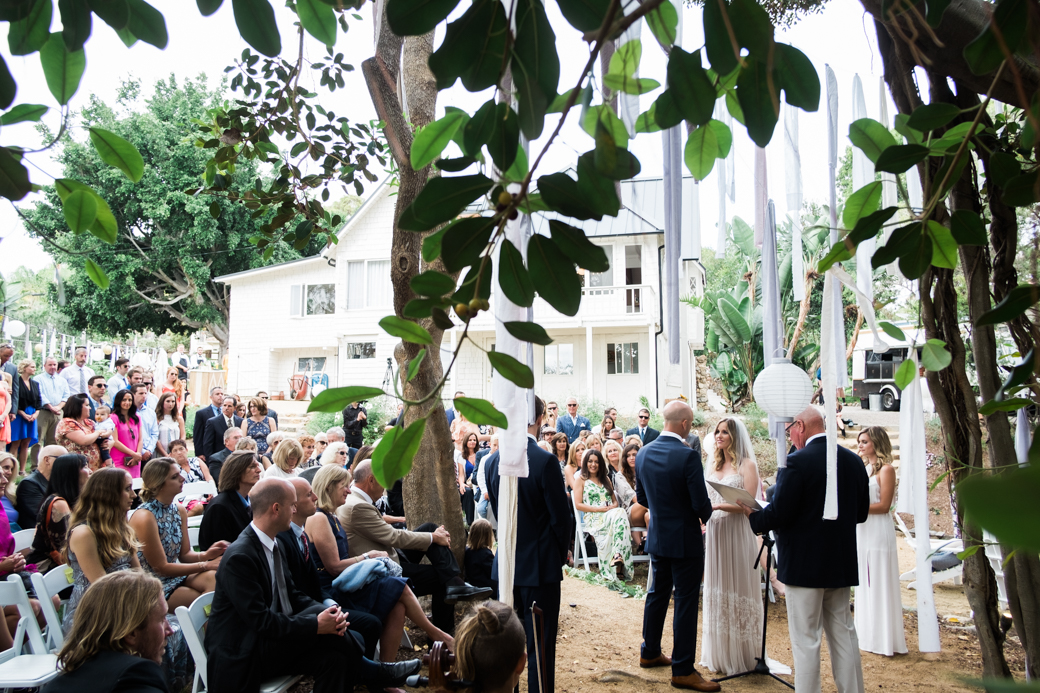
Photo by John Newsome Photography via Bridal Musings
So, before you dive headfirst into trimming your hedges, planting flowers and forgoing a traditional venue for your own back garden bash, I’ve rounded up a few things you need to consider that, unless you’re a seasoned party planner, you may never have thought of.
Some apply to all dry hire spaces (when you hire a venue without staff/furniture/food etc), while others are specific to throwing your wedding at home.
I’m really not trying to scare you, or put you off – like I said, I’m obsessed with weddings at home! – and many of these might not apply to your space.
A backyard wedding gives you freedom and flexibility, you can be creative, you can have fun, you can add quirky touches and you can make a whole weekend (or week) out of the party. But if something effortless and easy-going is what you’re after, I just want you to be informed of what you might need to pull it off.
I hope it comes in handy!
1. Weather-Proofing
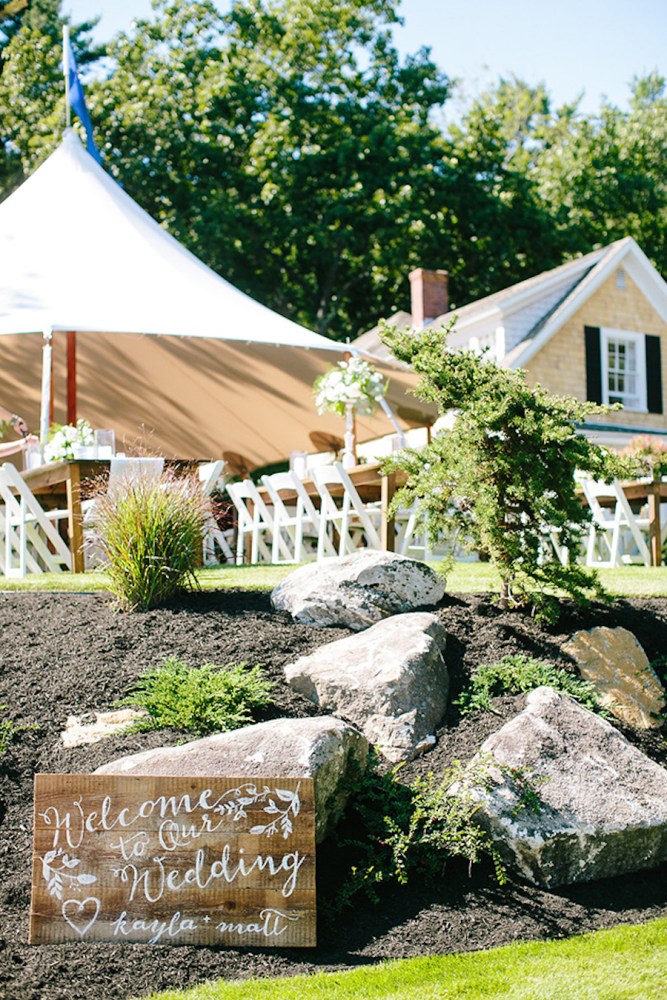
Photo by Zac Wolf Photography via Bridal Musings
Unless you live somewhere with guaranteed sunshine (do these places exist and can I move there?) or you happen to own a barn or a ballroom, you’ll need either a marquee or some kind of quick-assemble canopy on stand-by in case of rain.
Make sure you measure your space ahead of time, and ensure you have ample room to comfortably fit your marquee and any anchoring it might need, with space for a ceremony if you need it, a dancefloor, and room for chairs and tables to seat all your guests.
The day before your wedding is not the time to find out you don’t have the space for everything you’ve planned – particularly if there’s rain forecasted.
Likewise on the weather, think about blankets or outdoor heaters if your guests are likely to get chilly in the evening and there isn’t an indoor spot for them to hang out.
2. Set-up & Take-Down

Photo by Time of Joy Photography via Bridal Musings
One of the best things about having a venue look after your wedding, is that they’re responsible for things like setting the tables and cleaning up after the madness of your wedding.
While couples planning backyard weddings tend to relish taking time to set up and decorate their wedding over the few days before-hand, the manual on-the-day tasks like adding escort cards and polishing glasses, are less fun when you’d rather be kicking back and getting your hair done.
Likewise, cleaning up after a party and coordinating the collection of rentals is the last thing you want to do on your first morning as a married couple.
Even if you want to plan your wedding and do the bulk of the set-up yourself, consider hiring a day-of (and maybe day-after) coordinator to look after the logistics of setting up and taking down your party.
3. Cooking Facilities

Photo by Marilyn Bartman Photography via Bridal Musings
You can hire the best caterer in the world to do the food at your wedding, but they’ll need a place to cook.
Make sure your caterer is aware of the cooking facilities available to them from your very first correspondence. BBQ, pre-prepared food, and food truck style catering tends to work best for backyard weddings.
Make sure you check with your caterer what kind of hook-up they might need for power, and how much space they require as well.
4. Chairs and Tables

Photo by Lauren Love Photography via Bridal Musings
Of course this depends on the style of your wedding, perhaps you’re serving canapés or street food instead of a sit down meal, maybe you want lounge style seating rather than chairs and tables.
Just make sure there’s plenty of places for people to sit, if they need to and particularly keep in mind older relatives, who might need a ‘proper chair’. Oh and if you’re doubling up on ceremony and reception seats, assign someone to coordinate moving them from one space to the other (you don’t want to be looking after that straight after your vows!).
5. Tableware
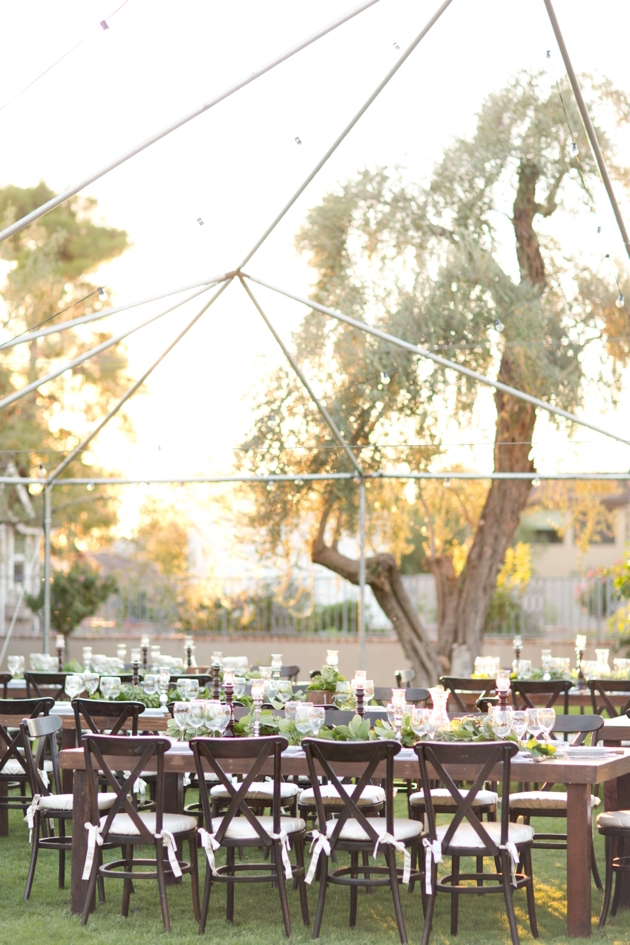
Photo by Amy & Jordan Photography via Bridal Musings
If you’re having a wedding at home, you’re responsible for sourcing ever plate, teaspoon, salt shaker and wine glass for your wedding.
For smaller weddings or full service caterers, this won’t be an issue, but for other couples, this might be more of a logistical task. Though it does mean you can select something really unusual!
Go through the plan for your day from start to finish to make sure you’ll have more than enough to cover everything you need. You don’t want a mad scramble to go wash glasses between the cocktail hour and the toast.
Talk to your rental company about clean-up (some are fine to take them back unwashed) and collection. Washing, counting and carefully wrapping up 150 plates and pieces of cutlery the next morning is a bit of a task, so you’ll need to factor it into your delegation to-do list.
6. Accessibility
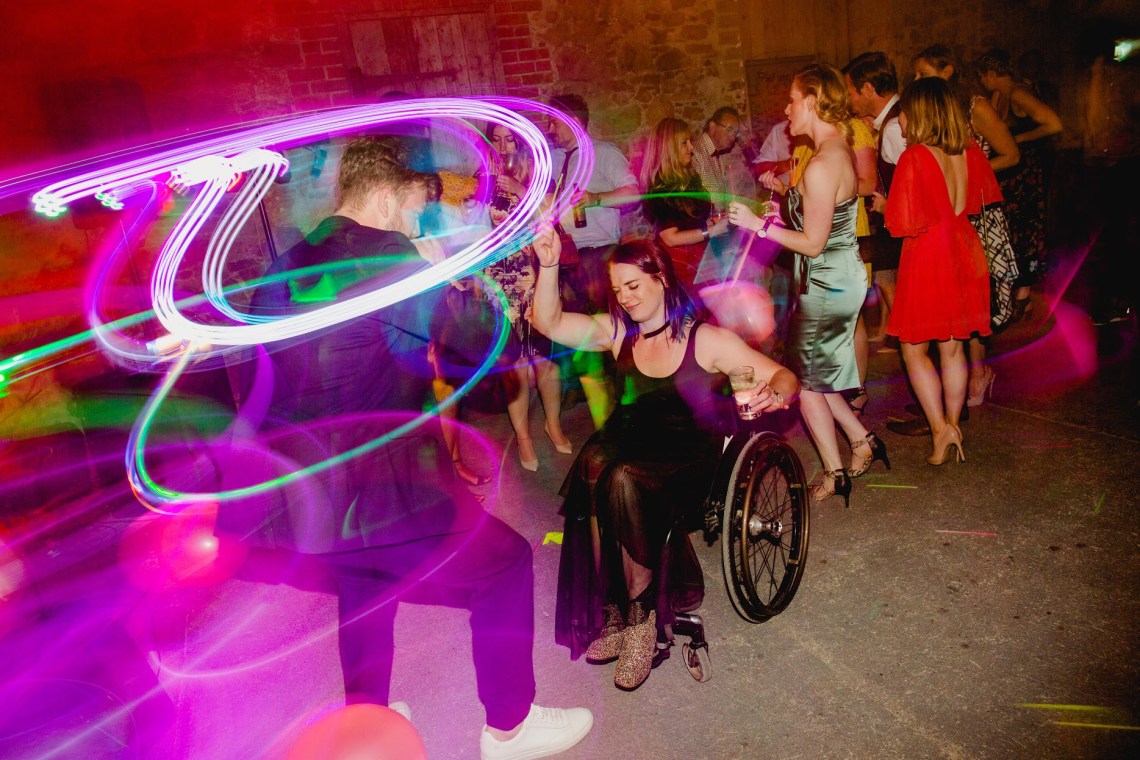
Photo by Navyblur via Bridal Musings
Accessibility covers both vendors and guests.
First of all, if you have any differently able guests – do try to keep them in mind when you’re planning your day. Ask them if they have any special requirements and how best you can meet them. Modern venues come equipped with ramps and accessible bathrooms so try to replicate that as best you can for the guests who need it.
Likewise access, in a logistical sense, is important too. Is there space for vans or trucks to pull up for the delivery of tables or a marquee? If you have a food truck or BBQ set-up, is there a wide-enough access to get it into your garden?
Additionally parking; Will there be enough room for everyone to park safely near your home, or should you coordinate some kind of car pooling or shuttle?
7. Bathrooms

Photo by Navyblur via Bridal Musings
I briefly mentioned accessible bathrooms above, but it’s important to consider your facilities, and what you’ll need for the volume of guests.
One or two bathrooms in your home are perfectly sufficient for a small wedding, but if you have a lot of guests, look into renting portable bathrooms to ensure there aren’t long queues and any domestic plumbing issues!
8. Staffing
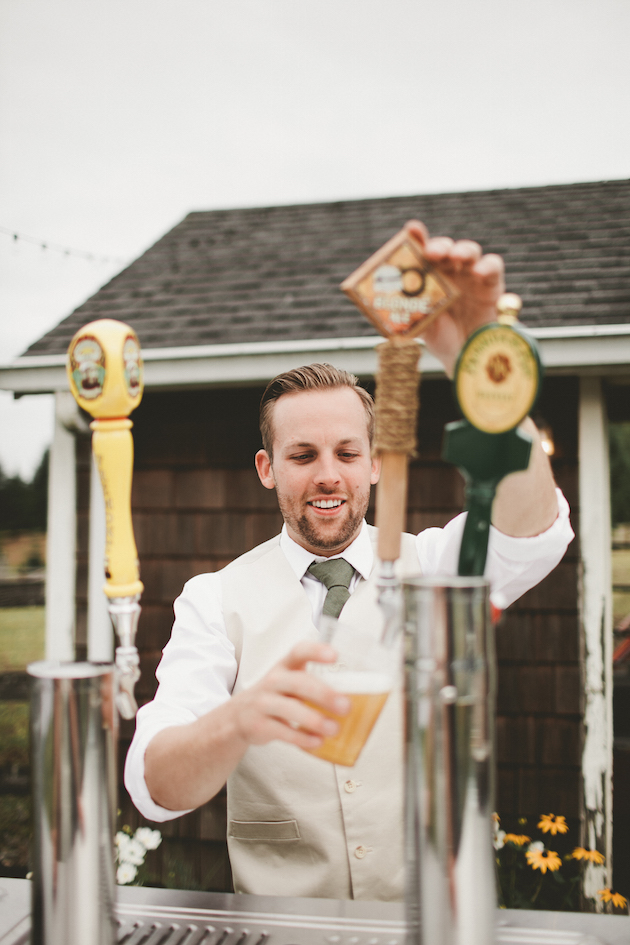
Photo by Alyssa Wilcox Photography via Bridal Musings
Who’s going to serve the food and work the bar at your wedding? Will they stay as long as the food is served, or can they work until the end of the evening?
Some caterers will provide staff, but they may only stay for the duration of dinner. While others will only look after the cooking of the food, so you’ll need to source waiters and bar staff yourself.
Talk to your caterer or planner about how many staff you need to ensure the smooth running of your day.
9. The Bar

Photo by Marilyn Bartman Photography via Bridal Musings
Having a manned bar is completely optional of course, you may just set up a drinks table, and let your guests serve themselves. This is particularly handy if you’re planning a late night party that will go on long after traditional closing time.
Do make sure you stock up on more drinks that you think you’ll need. If it’s a hot day, you might find your red wine drinkers opt for white wine or beer, likewise, some people tend to hit the spirits at an event like a wedding. Many drinks stores allow you to over-order and return what you don’t use.
Whether your bar is manned or not, don’t forget drinking water, ice, garnishes and soft drink options too.
10. Insurance
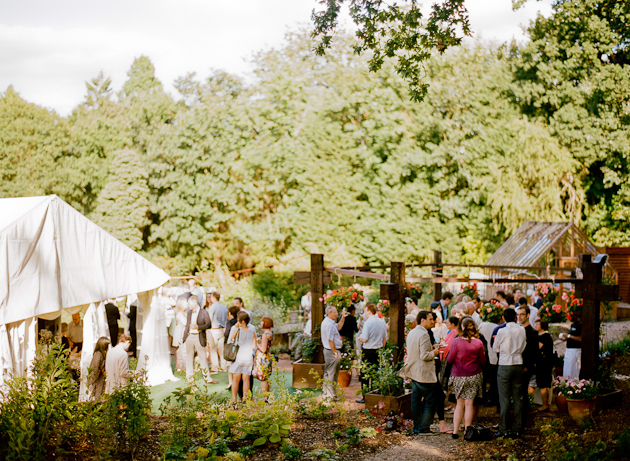
Photo by Peachey Photography via Bridal Musings
Ideally there won’t be any accidents on your wedding day, and everything will go smoothly, but just in case, it’s good to make sure you’re covered.
With a large volume of people in your home, (along with drinking and dancing) it’s a good idea to consider public liability insurance, just to cover any accidents. Talk to a planner or independent broker about what you might need for your space and event size.
No matter what though, make sure any vendors you’re working with have their own insurance, so that whether an electrician falls off a ladder, or one of your guests gets sick from under-cooked food, you have a fallback.
Again, let’s hope none of the above happens though, right! It’s just a fallback.
11. Services
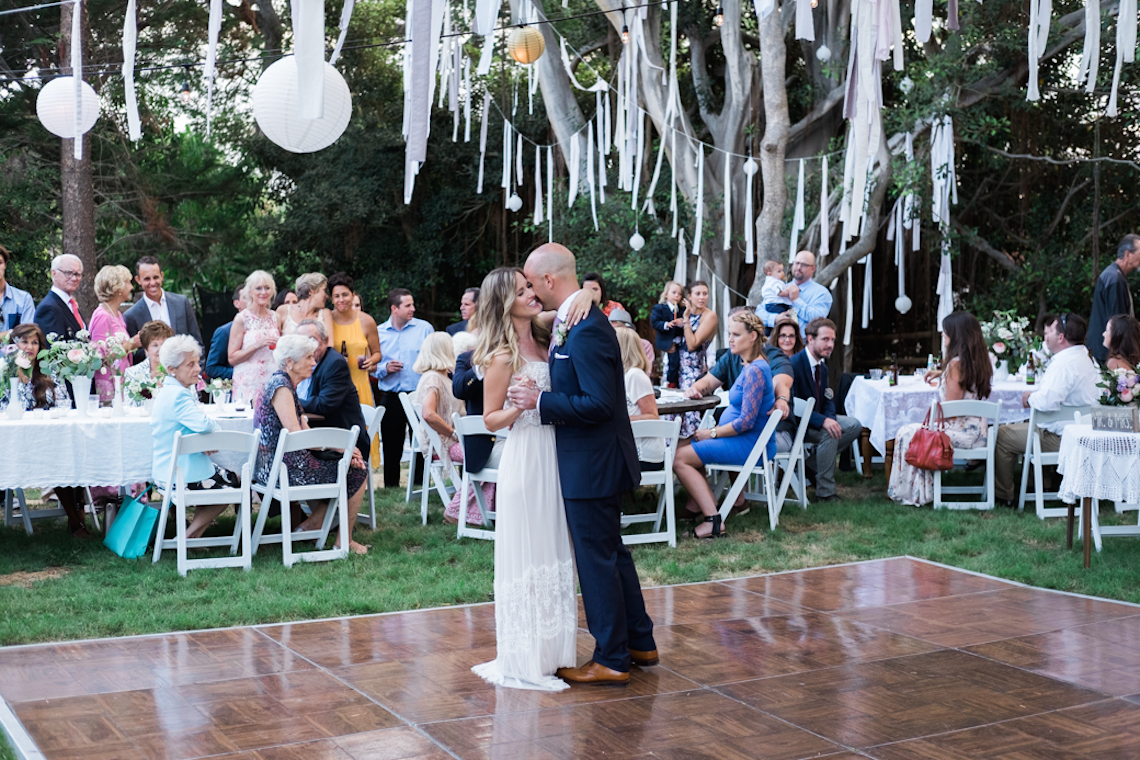
Photo by John Newsome Photography via Bridal Musings
So you may have thrown plenty of house parties in your day, but a wedding is a whole different ball game, especially if you have a lot of guests, and it may take its toll on your services.
While I’ve already mentioned plumbing issues, it’s essential, for catering and bathrooms that there is access from your garden (or wherever there is food prep) to clean water for washing and drinking.
Likewise, string lights, speakers, a mobile kitchen and a DJ booth, will be a drain on your electricity. If you don’t think your domestic fuse box can take it, make sure you hire a generator to avoid doing your first dance in the dark – to music from an iPhone speaker.
12. Neighbours
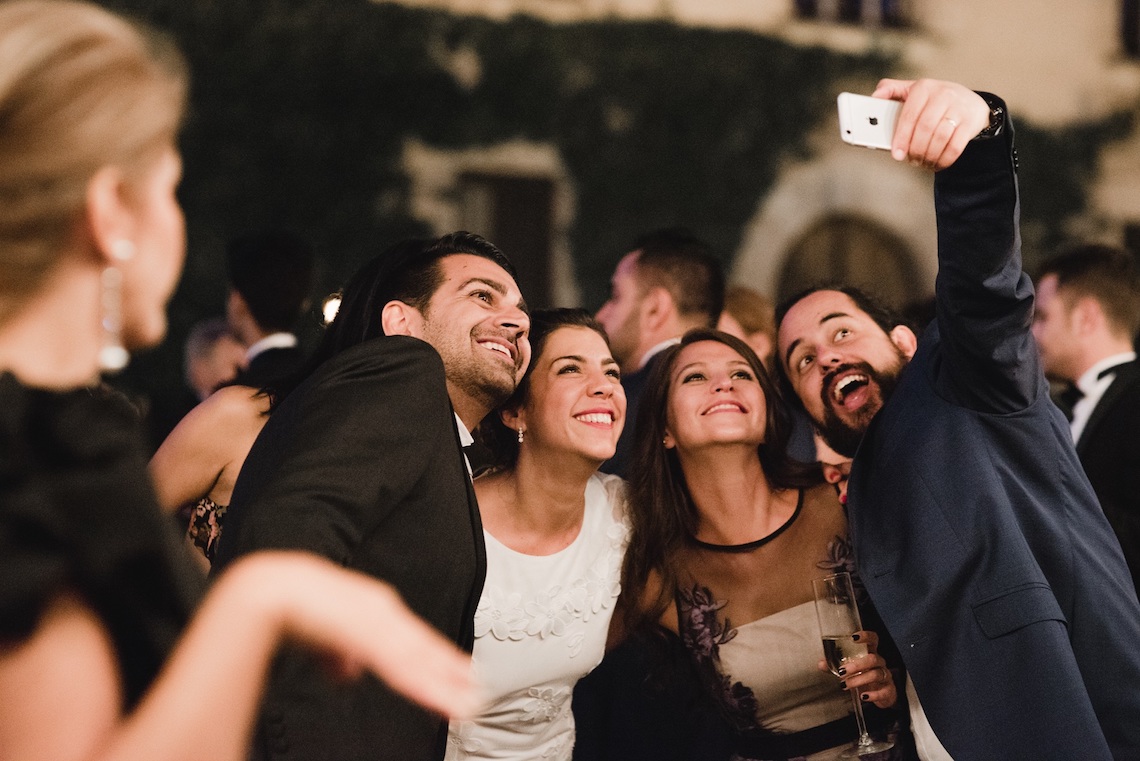
Photo by Visual Foto via Bridal Musings
And last but most certainly not least – consult your neighbours. I’m sure they’ll be more than happy for you, and maybe they’ll even be invited to your wedding, but do try to have things squared up with them before the big event to avoid any hassle on the day itself.
Whether it’s loud music after hours, or the number of cars parked outside your home, your neighbours, especially if they’re not aware what’s going on, may make complaints, or worse, call the police.
Consult with them beforehand, let them know what you have in mind, and chances are, they’ll offer to help however they can.





